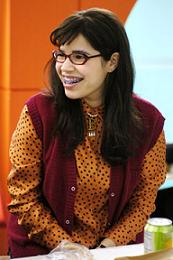 I love Betty Suarez. I admit when I reviewed the “Ugly Betty” pilot oh so many months ago, I was lukewarm, but mostly optomistic about the Salma Hayek-produced show based on the popular telenovela “Yo Soy Betty La Fea.” In hindsight, I must have had a very bad day, because “Ugly Betty” is not only the best comedy on television, but the best “family” show on television as well.
I love Betty Suarez. I admit when I reviewed the “Ugly Betty” pilot oh so many months ago, I was lukewarm, but mostly optomistic about the Salma Hayek-produced show based on the popular telenovela “Yo Soy Betty La Fea.” In hindsight, I must have had a very bad day, because “Ugly Betty” is not only the best comedy on television, but the best “family” show on television as well.
You see, Betty, our Queens born-and-bred protagonist, always does the right thing, is rabidly loyal to her friends, and fiercely loves her family. (The kind of person we all wish we could be, but disdain others for being.) She is the embodiment of traits that could be terribly annoying in many prime-time characters, if only Betty wasn’t such a well-written character and America Ferrera such a talented actress. Ferrera portrays Betty ever so earnestly–such as in last night’s season finale when she gleefully believes that her boss, Daniel, saved a drowning Girl Scout in Central Park–but without a drop of treacle, and, her disappointment in finding out that he had acquired his bruise not from heroics, but from a drug dealer, was palpable.
Audiences cheered when Betty finally decided to fight for her crush Henry and he reciprocated in kind. “Finally,” audiences sighed, “Betty is going to be happy. Betty who makes everyone else’s live better will be getting her share.” And then they screamed a collective “Nooooooooooooooooooooo!” just moments later when Henry’s ex-girlfriend Charlie announces she’s pregnant. Crushed, Betty stops fighting for Henry so that he can move to Tuscon with Charlie and raise what he thinks is his baby. (This is a soap opera afterall.)
But, the beauty of “Betty” goes farther than just our perky protagonist. Mark and Amanda are the best gay man-straight woman couple since “Will & Grace’s” Jack and Karen; and they don’t overshadow the central characters thanks to great writing.
While some of the dialogue, entendre and innuendo may be too risque for the under tween set, the show is multi-dimensional, never bowing to derogatory stereotypes and allowing characters to have deliciously complex relationships. Even the “bad guys” have deep friendships. The conniving Wilhemina, who has seduced Bradford Meade into divorcing his incarcerated wife (played with perfection by Judith Light) and marrying her, gives up her coveted wedding date in order to get her assistant Mark back in her employ.
And while I will stop just short of calling the Suarez family “The Waltons” of aught-seven (John Boy never put walnuts in his competition’s chicken salad in order to get a part in the school musical), I will say that it is rare to find a family on television these days that has such genuine affection for and acceptance of each other. That’s why when Betty’s sister’s fiancee is shot in a convenience store heist, and Betty delivers the news to Hilda at her son Justin’s opening night as the lead in “West Side Story,” we are devasted too. Until next season, when Betty can bring a big, braced smile back to our faces.


